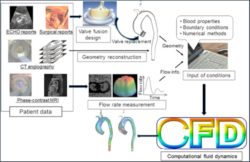Efficient Cardio-Vascular CFD-enabled 4D Flow MRI to Improve In-Silico Predictions of Post-Surgical Haemodynamics in Individual Patients
- Academic lead
- Zinedine Khatir (Mechanical Engineering)
- Industrial lead
- Malenka Bissell, Leeds Teaching Hospital Trust/School of Medicine
- Co-supervisor(s)
- Amirul Khan (Civil Engineering)
- Project themes
- Bio-Engineering/Medical Fluid Flows, Microflows & heat transfer
Computational fluid dynamics (CFD) is a well-established tool used in many engineering areas and has become the primary method for design and analysis. CFD has extensively been used in bioengineering to study physiological flows and is demonstrating huge potential. There is increasing interest in applying CFD-based techniques in medicine to model cardiovascular system in health and disease. CFD modelling is a new field within cardiovascular medicine, enhancing diagnostic assessment, device design and clinical trials. With improvements in surgical and medical management, congenital heart patients are often living well into adulthood. Magnetic resonance imaging (MRI) provides critical data for diagnosis and monitoring of these patients, yielding information on cardiac anatomy, blood flow, and cardiac function. Four-dimensional (4D) flow is emerging as a novel technique for comprehensive assessment of 3D haemodynamics.
The purpose of this multidisciplinary-enabled PhD project is to combine efficient CFD-based techniques with 4D flow MRI cardio-vascular for improved in silico hydrodynamics prediction.
This study is expected to make a fundamentally important contribution to the science of cardio-vascular systems and may have a medically significant impact on the design of new in-silico assistance technologies.

Figure 1: This project involves the application of a robust combined 4D flow MRI and computational fluid dynamics methodology to produce an in-silico patient specific assessment design tool for the prediction of post-surgical treatment.
